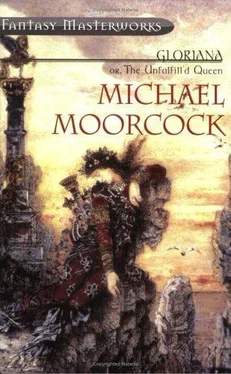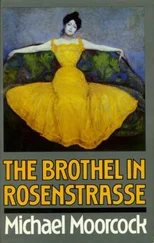Michael Moorcock - Gloriana
Здесь есть возможность читать онлайн «Michael Moorcock - Gloriana» весь текст электронной книги совершенно бесплатно (целиком полную версию без сокращений). В некоторых случаях можно слушать аудио, скачать через торрент в формате fb2 и присутствует краткое содержание. Жанр: Фэнтези, на английском языке. Описание произведения, (предисловие) а так же отзывы посетителей доступны на портале библиотеки ЛибКат.
- Название:Gloriana
- Автор:
- Жанр:
- Год:неизвестен
- ISBN:нет данных
- Рейтинг книги:5 / 5. Голосов: 1
-
Избранное:Добавить в избранное
- Отзывы:
-
Ваша оценка:
- 100
- 1
- 2
- 3
- 4
- 5
Gloriana: краткое содержание, описание и аннотация
Предлагаем к чтению аннотацию, описание, краткое содержание или предисловие (зависит от того, что написал сам автор книги «Gloriana»). Если вы не нашли необходимую информацию о книге — напишите в комментариях, мы постараемся отыскать её.
Gloriana — читать онлайн бесплатно полную книгу (весь текст) целиком
Ниже представлен текст книги, разбитый по страницам. Система сохранения места последней прочитанной страницы, позволяет с удобством читать онлайн бесплатно книгу «Gloriana», без необходимости каждый раз заново искать на чём Вы остановились. Поставьте закладку, и сможете в любой момент перейти на страницу, на которой закончили чтение.
Интервал:
Закладка:
“No, I have not.”
“You have made insinuations.”
“I spoke of common gossip.” The Saracen realises he has betrayed his own pride and bites his lip as Captain Quire again grins up into his face.
“It is unseemly, in a great lord, surely, to give such gossip credence? And as for reporting the tittle-tattle of the gutter, that is certainly dishonourable.”
“I admit it.” The Moor shrugs. “Very well, I’ll fight. Must I find a second from this rabble? Are there no gentlemen upon whom I can call?”
“Only Master Wheldrake. Shall we see how much liquor is left in him?” Quire makes no move around the table. Tinkler steps back to let Lord Ibram pass. Quire begins to walk along the gallery towards the passage where Wheldrake disappeared, but the Moor stays him.
“The poor creature would not be capable.”
“Then one of these.” Quire indicates the population below. “Any will do it, if you pay.”
The Moor leans over the rail. “I require a second in a duel. A crown to the man who comes with me.” He displays the silver coin. The ruffler in leather, who lately went fighting through the door, has returned, presumably by means of another entrance. He is red-faced and there are two long scratches across his forehead, a bruise on his bald scalp, and his ear has been cut-he holds a sponge against it.
“I’ll do it. I’d rather be a witness than a participant.”
Quire smiles. “What became of your opponent?”
“He ran off, sir. But he left this behind.” He reaches to the table nearest him and displays a severed nose. “I bit it off. He wanted it back so that he might find a barber to sew it on again. I won it fairly and refused to return it.” Laughing, he flings it towards the fire, but it falls short and begins to roast on the tiles.
Lord Ibram turns to Captain Quire. “You know something of me? Sir Launcelot will have told you?”
“That you’re a good swordsman?”
“Then you reckon yourself a better?”
Quire will not answer.
The party leaves the tavern by the back entrance, moving along the river path to where a carriage still waits. It is the one that brought Quire and Ibram to the Seahorse. They are all shivering as they clamber in and Quire gives the coachman directions for the White Hall fields. Quire looks out once at the broad, black river. Snow falls upon it. It seems to move more sluggishly than usual. Through the snow he sees the faint outline, the lights of a good-sized ship, hears the splashing oars of tugs towing it in to the dock at Charing Cross. He glances at the glowering Moor, whose anger seems primarily directed inward, he winks at Tinkler, who grins a snaggletoothed grin, but he does not look at the soldier with the red sponge who begins, perhaps by way of earning his silver, to try to engage Lord Ibram in friendly conversation.
The carriage bumps over frozen ruts and is swallowed.
On board the ship coming so late and with such difficulty up the Thames, Sir Thomasin Ffynne stamps one foot of flesh and one of carved bone upon the timbers of his bridge and thinks his breath must freeze before his eyes. He hopes the dawn will come before the ship reaches her dock, for he mistrusts the tugmen hauling her. There are not too many lights burning and those he can see are obscured by the weather. Heavy snow coats the whole ship, yards, rigging, rails and decks. It settles upon Tom Ffynne’s hat, his shoulders; it threatens to slip between boot and stocking and freeze his remaining foot so that it will also have to be removed (it was frostbite took the other, on his famous voyage into the Arctic Circle).
Tom Ffynne is back from his pirating-toll-gathering, he calls it-in the Mexican Sea. He had hoped to be back for the Yuletide Festival, then for the New Year’s Masque, but has missed both and so is in poor temper. Yet he looks gladly at his London, at the distant great glistening palace, and he even thanks the lad who brings him a tin cup of hot rum from the galley. He sips, the metal burning his bearded lips, and grunts, and stomps, and sings out in his sharp falsetto at the tugboats whenever it seems to him that the ship moves too closely to the high embankments of the riverside. Diminutive, plump, ruddy-faced and twinkling, Sir Thomasin Ffynne’s appearance disguises one of the shrewdest brains in all Albion. An admiral at twenty-six, he sailed with the war fleets of King Hern, in the old days of conquest and pillage, and it was under Hern that he became known as Bad Tom Ffynne, in an age that had many bad men in it. Yet his love for the Queen is as strong as Lord Montfallcon’s, one of the few others who survived Hern’s reign with some sort of honour, and one of the few still to hold office under Gloriana. It was Tom Ffynne’s uncle who took the Moorish Caliphates for Hern, but it was Tom Ffynne who held them, made them almost totally dependent upon Albion for their defence, their survival. Two revolts in the great continent of Virginia were also put down by Ffynne, assuring his nation’s power; and in Cathay, in India, in all the kingdoms of Asia and on the coasts of Africa, Tom Ffynne has fought, with absolute savagery, to maintain Albion’s dominance over these lands which are now Gloriana’s protectorates and which she does conscientiously protect, forbidding violence, demanding justice for all those for whom she accepts responsibility. Baffling days for Ffynne, who once possessed a reasonable trust in terror as the best instrument for maintaining Order in the universe; who saw all this new Law as an unnecessary expense, a wasteful business that was, moreover, abused by those it was intended to benefit; yet he has come to respect his Matriarch’s wishes, maintains a grudging inactivity where the Queen specifically forbids his movements, and contents himself with exploratory journeys involving a little incidental piracy, so long as the ships involved are not under the protection of a far too generous monarch. The holds of his tall ship, the Tristram and Isolde, are currently full, half with the treasure of some West Indian Emperor, whose cities Tom Ffynne visited on a voyage along a broad river which took him hundreds of miles into the interior, and half with cloth and ingots taken off two Iberian caravels after an engagement lasting five hours near the coast of California, that most westerly of Virginia’s provinces. Tom Ffynne intends to deliver all to his Queen, but retains an educated hope that the Queen will let a large share be kept back for the Tristram and Isolde’s officers and men. He is anxious to be granted an audience for another reason: He has news which he knows will interest Montfall-con and possibly alarm the Queen.
Ffynne realises that the dawn has come without his noticing it, the snow is so thick. Gradually the horizon grows pale, revealing a palace like some gigantic alpine peak, a London half-buried in snow, a Thames on which ice is forming even as the ship moves through it.
All is white and silent. Tom Ffynne stops his stamping to stand in wonder at the sight of Albion’s capital on this New Year’s Day, beginning the thirteenth year of Gloriana’s peaceful reign and, according to old Doctor Dee, the Queen’s astrologer, the most significant both in her life and in the history of the Realm.
Tom Ffynne lets out a huge, billowing breath. He claps mittened hands together and shakes little icicles from his dark beard, grunting with pleasure at the sight of his home port, in all its proud, frozen glory; its temporary tranquillity.
THE SECOND CHAPTER
From white sheets, in a huge ivory gown trimmed with silver lace, her hair enclosed in a cap of plain linen, her pale hands decorated by nothing but two matching rings of pearls and platinum, Queen Gloriana pushed back bleached silk bed-curtains, rose and crossed to the window. On snowy lawns albino peacocks paced between carved yew hedges which this morning were like marble. A few flakes still fell to cover the darker tracks of the birds, but the milky sky grew lighter as she watched and there was even a trace of the faintest blue. She turned to where her little maid of honour, Mary Perrott, stood beside the breakfast tray with its heavy burden of silver. “You’re very pretty this morning, Mary. Good colour. Womanly. But tired, I think.” In affirmation, Lady Mary yawned. “The festivities…” “I fear I left the masque a little early. Did your father like it? And your brothers and sisters? Was it enjoyable to them? The entertainers? Were they amusing?” She asked many questions so that none might be answered.
Читать дальшеИнтервал:
Закладка:
Похожие книги на «Gloriana»
Представляем Вашему вниманию похожие книги на «Gloriana» списком для выбора. Мы отобрали схожую по названию и смыслу литературу в надежде предоставить читателям больше вариантов отыскать новые, интересные, ещё непрочитанные произведения.
Обсуждение, отзывы о книге «Gloriana» и просто собственные мнения читателей. Оставьте ваши комментарии, напишите, что Вы думаете о произведении, его смысле или главных героях. Укажите что конкретно понравилось, а что нет, и почему Вы так считаете.






